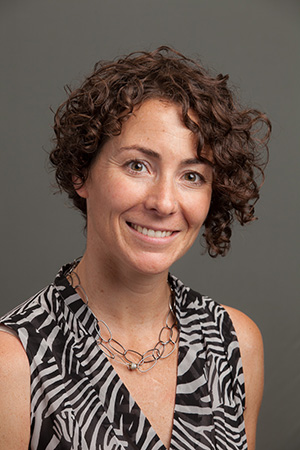Faculty Profile
Katie Oliviero
(she/her/hers)Associate Professor of Women's, Gender and Sexuality Studies (2014)Contact Information
Denny Hall Room 04
717-254-8311
Bio
Dr. Oliviero's teaching and research specializations include transnational feminisms, immigration, QLGBT studies, critical race theory, reproductive justice, law, social movements and cultural analysis. Her book, "Vulnerability Politics: The Uses and Abuses of Precarity in Political Debate" (NYU University Press, 2018) explores how social movements leverage nationalist, gendered, racialized and sexualized narratives of risk to influence the law in controversies over immigration, gay rights, reproductive justice and state-sponsored violence. Additional publications on queer marriage, stand your ground laws, the murder of Trayvon Martin, and the Dreamers appear in Debating Same-Sex Marriage in the Lesbian and Gay Movement(Minnesota UP 2013), Feminist Formations (2013, 2016); Frontiers (2021); Signs (2011/2017); and Women's Studies International Forum (2009). A new project explores if concepts of precarity and resilience can rework existing feminism global justice frameworks, with an emphasis on sexual asylum policies, migration, LGBT parents citizenship-transmission rights, and disability. Katie holds a PhD and MA in Gender Studies from UCLA, and a BA in Women’'s Studies from Dartmouth College. As a recipient of a 2010-2012 postdoctoral fellowship at Emory University School of Law, she taught classes in both the Gender Studies doctoral program and the law school under the auspices of the Feminism and Legal Theory Project as well as the Vulnerability and Human Condition Initiative. Between 2012-2014, Dr. Oliviero was an American Council of Learned Societies New Faculty Fellow at the University of Colorado, Boulder's Women and Gender Studies program and law school.
Education
- B.A., Dartmouth College, 2002
- M.A., University of California-Los Angeles, 2007
- Ph.D., 2010
2023-2024 Academic Year
Fall 2023
FYSM 100 First-Year Seminar
The First-Year Seminar (FYS) introduces students to Dickinson as a "community of inquiry" by developing habits of mind essential to liberal learning. Through the study of a compelling issue or broad topic chosen by their faculty member, students will:
- Critically analyze information and ideas
- Examine issues from multiple perspectives
- Discuss, debate and defend ideas, including one's own views, with clarity and reason
- Develop discernment, facility and ethical responsibility in using information, and
- Create clear academic writing
The small group seminar format of this course promotes discussion and interaction among students and their professor. In addition, the professor serves as students' initial academic advisor. This course does not duplicate in content any other course in the curriculum and may not be used to fulfill any other graduation requirement.
WGSS 300 Feminist Perspect & Theories
This course deepens students’ understandings of how feminist perspectives situate power and privilege in relationship to interlocking categories of gender, race, class, sexuality, ability and nation. Through foundational theoretical texts, it expands students’ understandings of significant theoretical frameworks that inform women’s, gender, critical race and sexuality studies, as well as debates and tensions within them. Frameworks may include political activisms, materialist feminism, standpoint epistemologies, critiques of scientific objectivity, intersectionality, postcolonialism, psychoanalysis, queer theory, transnational critique and feminist legal theory. Helps students develop more nuanced understandings of the relationship between everyday experiences, political institutions, forms of resistance and theoretical meaning-making. Prerequisite: WGSS 100 or 208.
Spring 2024
WGSS 208 Intro to Sexuality Studies
Cross-listed with HEST 250-01.
HEST 250 Intro to Sexuality Studies
Cross-listed with WGSS 208-01.
INST 290 Immigration Politics
Cross-listed with SOCI 310-01 and WGSS 310-01. Why do global controversies over immigration so often center on migrant women's fertility and their children's access to government benefits? Why do some countries accept LGBTQ migrants but deny them the right to adopt, use assisted reproductive technologies, or extend citizenship to their children? How are efforts to limit marriage-and-family based migration racialized and classed? What are the gendered implications when nurses are a country's central export? Could building a border wall or sending refugees back stop unwanted immigration? This course examines how intersecting gender, sexual and ethnic hierarchies shape and are shaped by immigration. Applying insights from feminist and queer theories of migration, students will explore how the gendered processes surrounding immigration craft concepts of nation, borders and citizenship. Readings and films examine how racial and sexual norms are renegotiated through the selection and regulation of immigrants. Central to our investigation is how transnational and economic forces compel migration, reshaping understandings of national belonging, workplaces, and family in the process. We will particularly consider how migrants negotiate multiple marginalizations, and in turn refashion understandings of community, identities, culture, and politics. An interdisciplinary framework combines sociological, historical, legal, activist, media, literary and artistic accounts. Prerequisite: One WGSS or SOCI course, or permission of instructor; not appropriate for first-year students.
SOCI 310 Immigration Politics
Cross-listed with INST 290-02 and WGSS 310-01.
WGSS 310 Immigration Politics
Cross-listed with SOCI 310-01 and INST 290-02.
WGSS 400 Senior Seminar
All topics will draw upon the knowledge of the history and theories of feminism and will be interdisciplinary in nature. Prerequisite or co-requisite: 100, 200 and 300 or permission of the instructor.
